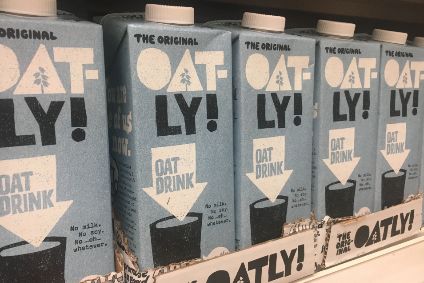The fierce debate over how to label plant-based dairy products in the EU has returned to the fore, with dairy-alternative players not mincing their words, GlobalData Consumer says.
With the trend for plant-based alternatives to animal products continuing to pick up steam, both in terms of technological innovation and consumer appeal, the benefits in terms of sustainability, ethics and health should be powerful motivators for governmental encouragement of the sector’s growth.

Access deeper industry intelligence
Experience unmatched clarity with a single platform that combines unique data, AI, and human expertise.
Recent legislative activity in the EU suggests the power and cash of the animal agriculture lobby, in its various forms, is still powerful in swaying decision-makers. Now, however, a fightback from the plant-based industry has begun.
The EU has already banned the use of some dairy-derived descriptors for plant-based alternative products in recent times. For example, ‘almond milk’ or ‘vegan cheese’ are terms no longer permitted. The move by MEPs in the European Parliament to vote to push forward with Amendment 171, which would ban all dairy-based descriptors such as ‘yogurt-style’ or ‘cheese alternative’ (along with packaging styles similar to dairy equivalents like milk cartons or blocks of butter and cheese) has caused great consternation for plant-based brands. There have been howls of bias and influence peddling.
Now Sweden-based plant-milk alternative brand Oatly has partnered with ProVeg International to petition The European Commission to reject the parliament’s decision and squash Amendment 171, which it refers to as “plant-based censorship”. Oatly hasn’t minced its words: an Instagram post noted the vote wasn’t particularly surprising “considering there are more milk lobbyists in Brussels than actual cows in pasture during the summer months”.
In October, when the parliament passed 171, GlobalData argued the move looked like “strikingly bad PR for both the dairy industry and the EU”. The dairy industry looked reactionary and in opposition to trends that are increasingly ascendant, i.e. the embrace of dairy alternatives for health, ethical, sustainably-responsible reasons. The plant-based industry’s fightback that could widen public awareness of the decision and raise their ire towards the EU and the dairy industry.

US Tariffs are shifting - will you react or anticipate?
Don’t let policy changes catch you off guard. Stay proactive with real-time data and expert analysis.
By GlobalDataA Commission decision to support the Parliament's decision and force plant-based brands to reposition their products and redesign packaging could be a blow to a nascent and promising industry. It smacks of hypocrisy in relation to ethicality and sustainability. Plant-based products are supported by the public for both dietary/health benefits and their ethical and sustainable ethos and approach. There is often, among the innovators in the sector, a genuinely-held and evangelised commitment to changing humanity's approach to intensive farming and offering a less impactful model that still delivers for a growing population and delivers products that match the experience of animal equivalents. These are the kind of goals technocrats like to espouse, but consistency of message becomes a problem when such ideals collide with relationships with industry lobbyists.
If the dairy industry really feels they need to push this issue hard, then it tends to suggest they have bigger problems than the development of a relatively small new sector. It suggests a fear of change, an awareness the prevailing course of food-chain development in the coming decades will go against them, and thus delaying tactics are required. What may be a more forward-thinking strategy for the dairy sector would be to view plant-based alternatives as an opportunity to begin to future-proof their business models through investment and learning.
For plant-based brands, the immediate goal should be to fight their corner with maximum effort, while using the inevitable heightened public attention to such a story to raise awareness of their offerings and their positive ethos to an increasingly receptive consumer base across the EU and elsewhere.


